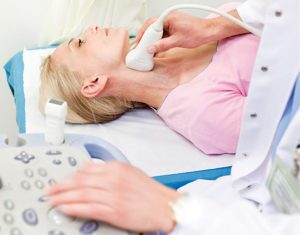 When carotid arteries build up with plaque, the risk of stroke is high; it’s common for individuals to show no symptoms until the plaque build-up (atherosclerosis) is severe, this condition is referred to as Carotid Arterial Stenosis. Because atherosclerosis causes a blockage and narrowing of the artery, it prevents proper oxygen and blood flow to the brain. The plaque can break off, and/or blood clots can form in this area and travel the brain.
When carotid arteries build up with plaque, the risk of stroke is high; it’s common for individuals to show no symptoms until the plaque build-up (atherosclerosis) is severe, this condition is referred to as Carotid Arterial Stenosis. Because atherosclerosis causes a blockage and narrowing of the artery, it prevents proper oxygen and blood flow to the brain. The plaque can break off, and/or blood clots can form in this area and travel the brain.
Screenings and Diagnostics
Duplex Scan
In order to get a picture of where the blockage is, very advanced machines using ultrasound can painlessly and non-invasively produce pictures showing the blood vessels and the blood flowing through them. This process is a little like radar. The test is called a duplex or ultrasound scan. When performed in an accredited vascular lab such as ours, this test should be all that is necessary to diagnose and plan treatment.
CT Scan
Most commonly, information not obtained about the carotid artery on ultrasound can be obtained by performing a CAT scan. During the CAT scan, dye is injected in the blood vessels through an IV. The procedure is otherwise noninvasive and only takes 15 minutes.
Angiogram
Rarely, an angiogram will need to be performed. In this procedure, the doctor will insert a needle into the artery and inject a special dye. This will allow detailed pictures of the inside of the arteries. The needle is usually inserted via the groin or femoral artery. A sensation of heat often accompanies the dye injection however, local anesthesia and sedation is used to eliminate pain.
Treatment Options
Medications
There are no medications that can make the plaque disappear; however in some patients, strict control of cholesterol can stabilize the plaque and decrease plaque progression.
However, some TIA (Transient Ischemic Attack) and strokes are due to dislodgement of blood clots from the plaque into the brain. These blood “clots” are really aggregations of small blood particles called platelets. Using anti-platelet medication such as Aspirin may prevent this aggregation and subsequent TIA or stroke. Newer more effective medications are being added every year such as Aggrenox® and Plavix®. In patients with mild plaque these medications should be considered. However, side effects can occur, and you should discuss the potential risk/benefit with your doctor.
Surgical Endarterectomy
The surgical procedure to remove plaque is called a carotid endarterectomy. Although usually quite safe, some patients will suffer a stroke, nerve damage or heart attack from the procedure. Accordingly, the benefits of this procedure will depend greatly on the skill of the surgeon. It is imperative that you ask your board certified surgeon about his or her experience. A major study of stroke risk has been conducted under the auspices of the National Institute of Health. Current guidelines recommend treatment for asymptomatic disease >80% narrowing and symptomatic narrowing >50% (history of stroke/ministroke).
Stent/TCAR Procedure
Recently, a new procedure for the placement of stents in the carotid artery has been developed. This procedure is called TransCArotid Revasularization (TCAR). Sarasota Vascular Specialists is considered a center of excellence for performing the TCAR procedure. In the procedure, an incision is made low in the neck to isolate the carotid artery. A catheter and wire are then inserted through the artery. The procedure involves reversing the flow of blood in the carotid artery before the artery is ballooned and stented. If material breaks off when the artery is ballooned, it is suctioned out of the body instead of going to the brain to cause a stroke. Not all patients qualify for the procedure.
Sarasota Vascular Specialists
All of the surgeons at Sarasota Vascular Specialists are board certified. Their practice is the premier medical practice in the Tri-county area dedicated to the treatment of patients with disorders of the veins and arteries. Unlike most vascular surgical groups, they are also uniquely trained and experienced to offer all forms of diagnosis and therapy including:
• Varicose veins, spider veins, deep venous thrombosis
• Carotid artery surgery and carotid stenting
• Medical management, angioplasty, bypass
• Thoracic and abdominal aortic aneurysms
Sarasota Vascular Specialists has an onsite lab to perform ultrasound and give rapid diagnostics. Their vascular lab can non-invasively diagnose all arterial and venous diseases. Their experienced vascular lab staff includes seven registered vascular technologists.
It’s the first vascular laboratory in Sarasota to be certified by the Intersocietal Commission for the Accreditation of Vascular Laboratories. The lab was also featured as the gold standard facility by ABC Television’s Prime Time when it evaluated vascular labs in Florida. They have over $500,000 invested in state-of-the-art GE Ultrasound machines.
To schedule your appointment, please call 941-371-6565, or visit veinsandarteries.com to find out more.
Sarasota Vascular Specialists
941-371-6565
www.veinsandarteries.com
Sarasota
600 N. Cattlemen Road, Sarasota, Florida 34232









